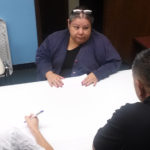As a Christian I can only speak about us, and even then I can only speak of those who believe as I do. I started off my Christian walk with lots of questions. Who and what is God? What is this thing called sin? Why are there so many groups and denominations within Christianity? What makes Christianity different, and maybe better than the rest? And, many, many, more questions.
I came to be saved at a time when I had just gone through a difficult time in my life. Many other believers have similar experiences. Something bad is happening, it may even be their fault, but due to this they turn to God as the answer. Some people, who were not believers, looked down on this. They’re perspective was that religion was a sort of crutch. To them believing in God was a sign of weakness, not something positive. I understood their complaints, I also believed in the same manner, before I became a believer. I saw religion, but Christianity specifically, as a flaw. Only dummies and fools believe in a God they cannot even see, was the way I saw it then.
I came to know Christ as my Savior as an educated man. My intelligence was never in question, though if you knew me back then, you would have questioned my maturity. As a new Christian I struggled with using my intelligence to understand the teachings I received from my pastor. He would teach or preach on some things which made my brain hurt. I was not hostile toward the teachings, but too often they did not make sense. I’m sure he was teaching everything in the right way, but my mind heard differently. Just have faith, trust God, walk like Jesus walked, keep your eyes on Jesus, and so forth. These phrases and many others were used in the teachings and preaching quite often. They seemed to make sense to the teacher or preacher, but I struggled to understand what they were trying to get across to me.
I remember one conversation with my pastor after one of his teaching sessions. He had been speaking of Satan and how he had governed over the world until Jesus died on the cross and put an end to it. I listened to what he was saying, but it seemed to conflict with Scripture. (See 2Co 2: 4) I approached him privately after the meeting and asked him how he arrived at the conclusion he did. I mentioned that the Bible teaches Satan is still the “god” of the world. He gave me a bothered look and said, “Brother, Satan may be your god, but he is not my God.” After this he walked away.
I was not sure what had happened. Here I am a new believer and I have questions, and my teacher gets annoyed when I questioned something. I would have understood his reaction if I had challenged his authority or something, but I sincerely had a valid question. I was a new believer and needed to learn whatever it was God wanted me to learn.
Before I came to be saved, one of my most interesting and pleasurable times was when I was in college. I did not know what to expect in college, but before then I assumed it was like High School. I went to High School for just one year. I went to my 10th grade class for one day and then I dropped out of school altogether. I went through several years not caring about my education, until I heard about this program where they paid you to go and study for your G. E. D. I laughed out loud when I heard about it. I thought it was hilarious that someone would pay others just to go to school. I jumped on the opportunity. I figured I would ride the gravy train until the money ran out and then do something else.
The Comprehensive Employment and Training Act (CETA) had partnered with a local program SER, which primarily worked with Latinos. I showed up and enrolled in the GED program and started getting paid. I was on “cloud nine” about the whole thing. I even took the GED tests. Unfortunately, I kept failing them. Even though I used the program to get some easy money, it kept bothering me that I wasn’t able to just breeze through the tests.
One day the program counselor called me to his office and told me he felt I was not trying. He was right, but I wasn’t going to admit it. I argued the tests were made hard on purpose for non-Whites. He told me I was making excuses. I told him I didn’t have to take anything from him, that I could quit. He responded quitting was exactly what he expected me to do, he called me a quitter and told me I could leave. He added that at least they would be able to give my spot to someone who really wanted help. I yelled at him that he could not call me a quitter, and that I would prove him wrong. I told him I would take the tests again, and I would pass them. He just smirked and said, “Sure, big talk. Okay then prove it.”
I had failed the tests at least twice before, and the one I had most trouble with was the one involving math. I went back to my class determined to prove him wrong. I studied hard for another two weeks, and then went to take the tests. I passed the first four, but there were five. I passed the first four in one day, and had to go back the next day to take the math test. I did not sleep well that night. I knew I could throw the first four passed tests in the counselor’s face, but knowing him, he would just ask for the math test, and then call me a liar because I didn’t pass it. He really did not think that way, I just imagined him that way because I was angry with him.
I showed up to the testing facility the next day and took the math test. I had studied hard the last night, but I was apprehensive about my chances of success. After the test, the man there told me to go back to the SER program, and he would relay the score back to me as he was quite busy at the time. I was back in my room when I was told I had a phone call. I went to the office and spoke with the GED man on the phone. He told me I did not do as well on the math test as I had on the others, but that I had met the minimum required score and had passed the test. I drove to the GED place and picked up my copies of the test results and went back to the SER program. I went to the counselor’s office and tossed the results on his desk in front of him. There was another employee in the room with him at the time.
I gave him my best “I told you” look, and said, “You were wrong, I passed all the GED tests!” I expected him to start apologizing and admit he was wrong. Instead, he said, “I knew all along you could do it. I had to challenge you to try harder, because you were about to quit. Before you entered,” he said, pointing to the other employee, “I told him you were capable of much more than you believed.” I looked toward the other guy, and he nodded in agreement. I later found out I had been the first “graduate” under the CETA program in Dallas, Texas. I changed my mind about learning after that. After I got married, my wife and I agreed I should go to college, while she worked and brought in the necessary income. I really enjoyed college.
I realized I found some classes interesting, while others seemed mostly boring. When I finally came to take history, I thought I was going to be bored. The professor changed that, what he did was divide the class in two groups and one group became the “Indians” (Native Americans, to you politically-correct people), and the second group became the Whites. Our job was to get enough data to support our perspective, and enough evidence to prove the other side wrong. I was in the “Indians” group.
I loved the way I had to do research to gather the information I needed. I learned to pay attention to details which otherwise would have eluded me. I learned more about the U. S. Government and their relations with the native population, in this manner, than I would have otherwise. The one thing which stuck with me was that to get to the truth one often had to go through a lot of half-truths, near-truths, and some which were not complete lies, and sounded truthful. That forced me to be more careful about what was being said, not said, and often mis-said (meaning someone is trying to say the truth, but are getting something not quite right). This is what I carried with me into my walk with Christ.
I started reading the Bible and paying attention. As a new Christian, there was much in the Word which I just did not understand. Much seemed clear, but then I would hear someone preach or teach on the same and they would come up with a completely different point of view. This confused me. I kept finding myself in situations where I would question the teacher to learn more, but instead they would react as though I was questioning their intelligence. I kept on butting heads with people until I realized I was going about it the wrong way.
I had been under the impression I had somehow entered the “college” of God and that those who had been “saved” longer than me would obviously know more than I would. I had met lots people who had been “Christians” for many years. But I also found that too often many of them had trouble backing their beliefs with “chapter and verse.” While I am not saying every believer has to know every chapter and verse for every single thing they claim to believe about God, I am saying that limiting their answers to some esoteric statements or conclusions of theirs was just wrong.
I especially struggled with those Bible teachers and preachers whose answer show an obvious lack of serious study and research. It’s kind of like they want you to believe what they say just because it was them who said it. That kind of teaching and preaching is not enjoyable to me in the least.
As I grew more in the lord, I also grew in my understanding that if I wanted to mature more, I would have to be careful who I listened to, and what I believed. I have had six pastors in my process of maturity. The first divorced his wife and ran away with the church organist. The second one was a temp. The third (who took over for the temporary pastor) died. The fourth was a wonderful pastor, but the church moved out of Dallas, and I moved to another local church. The fifth pastor accused me of wanting to take over his church, I left. The sixth pastor, again another wonderful pastor, also died. After this, I became my own pastor, and now I pastor other pastors.
My walk has been a troubled one, to say the least, but my maturity has increased due to those troubles. I came to understand that learning more about God and what He wants for me and in my life, was going to be dependent on me alone in the long run. I have encountered many good and studied Bible teachers, and have met pastors who had obviously taken time to pay attention to what they have gleamed from the Word.
As well, I started learning to look for God’s leading in ways I had not before. As I attended various seminars, conferences and other similar venues, my eyes, as it were, began to be open. And, along with that, I started asking the same questions I had from the beginning of my walk with the Lord. Those questions I had before which were not answered, became my immediate motive as I started researching the Bible.
I vowed to myself that regardless of whether or not others asked those same questions, or whether they even tried to get real answers, I needed to find the answers. In my case I started this by holding my own Bible studies. Even when I did not have as many answers as I do today, in those Bible studies I started dealing with subjects which were not popular in church sermons and teaching. Some people who came to those meetings did not come back, for whatever reason, but those who stayed did so because we were discussing and studying questions which were relevant and immediate to our lives.
Think about it, do you know where in the Bible to find the answers for any and all problems with which you deal? Just to say, “Keep your eyes on Jesus,” and, “Trust God,” does not tell you what steps to take to change things. Only lazy people will trust in phrases. To find real answers which are practical and will produce real change in your life will take time and effort in the study of the Word of God.
Are you in a Bible study at church? If not, are you in a Bible study at someone’s home? Are you taught how to research and study the Bible? Do they choose the topics of study for you and then lead you to specific answers? If you had to choose the topic or do the research for the class, would you know how? Do you know what the Bible says is the reason why we should even study our Bibles?
Early on in my walk I found out there were books like a concordance, lexicons, Bible dictionaries, commentaries by many writers, and so forth. I realized these were tools which could help me better understand the Scriptures. Maybe it was because of my experience in college, but I took to them like a dry sponge dropped in water. I sucked up all the knowledge these tools help me get. The more I learned, the more I started realizing how much I did not know about the Bible. My excitement involved more than just knowing some stories, or the names of some people who lived thousands of years ago, or even remembering some chapters and verses of things I read. My excitement stemmed from the fact I was learning stuff I could put into practice today, and see results today in most cases.
Heaven is great, and I am will enjoy it when I get there, but even if there are “golden streets,” that “gold” cannot help pay the bills here on earth today. What about the “crystal sea,” can it help quench one thirst here on earth? And, what about all the jewels which will be found on the city walls, how much monetary value do they have here? Heaven is in my future, but practicality is in my today. The question is not what will happen later, but how does he Bible impact my life today? Can it help me save a marriage today? Can it help me make important decisions today? Can it answer the tough questions of life today? Can it make a difference in my life today, or do I have to wait many years to see the benefits or results?
The Bible is full of practical instructions which will yield fruit today. You can learn to save a marriage by starting today to apply the principles taught in the Bible. You can starting changing your character today by following its instructions. You can benefit greatly starting today, from financial teaching found in the Scriptures. You can find answers today for many of those hard questions which have run around in your head for a long time now. The Bible is as much for today as it is for tomorrow.
The instructions found in the Bible are practical. For example, regarding finances, it teaches we should save money, lend only if we are able to deal with the loss of the money if we don’t get it back, never co-sign, have a budget and stick to it, invest wisely for the future, give to the poor, don’t be greedy, and much more. If we learn the principles the Bible teaches regarding finances and start applying them today, we will start seeing the results, reaping the benefits.
When you stress more on the practical things of the Bible, and less on the religious implications, you start to see how God uses His Word to show you His power. If He can get you to start doing some of those things in the Bible, the way He wants them done, He can also teach you to use the teaching to deal with things in your life, as well as help others do the same. God wants to bless you much, but not just because He wants to bless you, He wants you to use your blessing to minister to others in whatever way you have been blessed.






